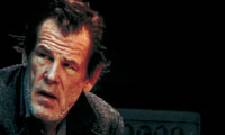|
|
||||
|
|
by Donald Levit 
Sam Shepard’s request that Michael Almereyda make a movie of a play of his is, on the surface of it, no more than an additional item to sell, a Director’s Cut variation. One viewer, who had seen This So-Called Disaster at Tribeca and came back hoping for changes (but didn’t notice any), remarked that it is actually a Sam Shepard play on celluloid. That the stage version sold out its limited November 14-December 17, 2000 run, was attributable to “Shepard Assembles All-Star Cast,” and the work has not gone on to acclaim. While not for many tastes, however, This So-Called Disaster is of interest for those concerned with acting and intuitive, on-going creative birth, the sometimes fruitful interaction among artists and, in different degree -- the theme of the drama --sons’ difficult accommodations to memories of parents. This is not precisely a documentary, although there are interviews and inserted stills and professional as well as home movie clips, nor a Carlos Saura semi-fiction developed around a performance troupe nor simply its sub-titled “Sam Shepard directs ‘The Late Henry Moss.’” Rather like a Stella Adler class, the non-narrated, blue-lighted work tracks the imperfect process of “letting go of the printed page,” and of artists transforming themselves, partly by dealing with phantoms from the past. More than sleight of hand, the admission of artificiality, of pretending, is here but to create another, subtle illusion, as in Genet’s audience-involving The Blacks. Shepard, indeed, in one of the informal brainstorming sessions observes that the older unobserved eavesdropper audience concept was done away with by Brecht. In essence, we become pre-release, pre-final editing reviewers at partially extempore rehearsals while interpreters grope their way through a preliminary draft, in younger brother Ray’s (Sean Penn) words, “to get to the heart of things.” Along that way, amidst jitters and jokes -- Woody Harrelson’s remark to Penn that “you had an understated performance in Shanghai Surprise” -- Nick Nolte (elder brother Earl) and Shepard consider their ghosts. Surrounded by heavy Art Deco, the actor probes his drinking, nervous breakdown, start and method in acting (“partly personal but [not] a Xerox of my life”) and the impact of the mother who “literally showed me how to die.” In a beat-up rocker on an isolated cabin porch, Shepard hunts the demon who was the father, the “Henry Moss” whose wandering ways, drinking and women, even after death, are essence and exorcism in the play. Dressed informally rumpled, they and the others rehearse as, down to the protocol and number of curtain calls, the stage drama is gestated. “Tech run-throughs” for Anne Militello’s lighting, choreography and exact positioning, T Bone Burnett’s “organic” music accompaniment, merge with acting and with outside personal demands -- Penn’s kids, Nolte’s son -- but the play’s the thing and the “difficulty to find the language to communicate [the territory] with the actor.” A current philosophy of science posits that the presence of a watcher alters what is watched, while of Garrick, the great actor of his eighteenth-century day, Oliver Goldsmith retaliated that “on the stage he was natural, simple, affecting; ‘Twas only that when he was off he was acting.” With celebrity lived in a fishbowl, how guarded or candid are our stars, our public figures? Which of Yul Brynner’s birthplaces and –dates is true, did Nolte play college football for Questions of the extent of, and reasons for, revelation aside, This So-Called Disaster does well in terms of the theater’s open-ended dialogue and development. However, those who care less for how things come to be than for the finished products themselves, may not be moved by this personal, insider’s film that's really a story within a play within a movie. (Released by IFC Films; not rated by MPAA.) |
||
|
© 2026 - ReelTalk Movie Reviews Website designed by Dot Pitch Studios, LLC |



